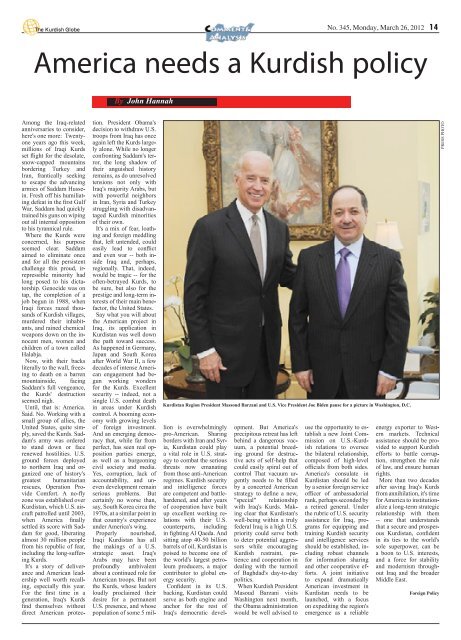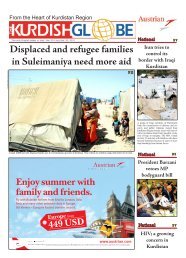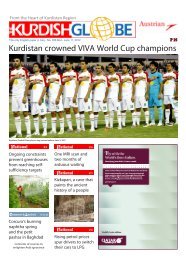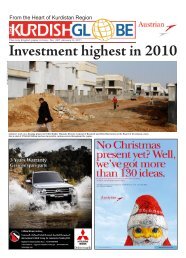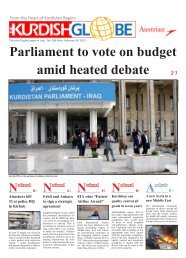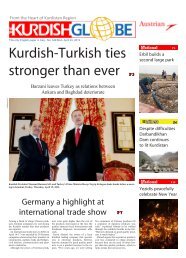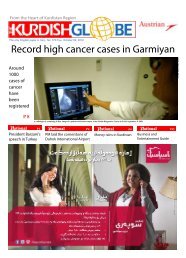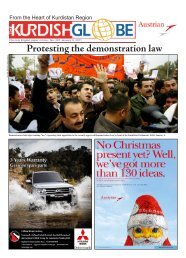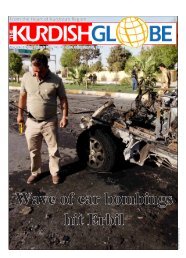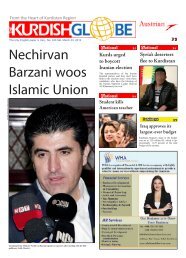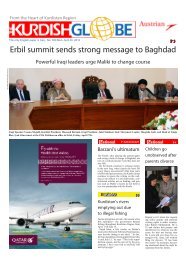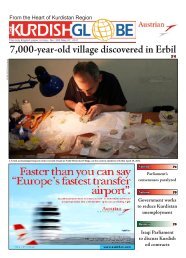National - Kurdish Globe
National - Kurdish Globe
National - Kurdish Globe
- No tags were found...
You also want an ePaper? Increase the reach of your titles
YUMPU automatically turns print PDFs into web optimized ePapers that Google loves.
The <strong>Kurdish</strong> <strong>Globe</strong> No. 345, Monday, March 26, 2012 14America needs a <strong>Kurdish</strong> policyBy John HannahAmong the Iraq-relatedanniversaries to consider,here's one more: Twentyoneyears ago this week,millions of Iraqi Kurdsset flight for the desolate,snow-capped mountainsbordering Turkey andIran, frantically seekingto escape the advancingarmies of Saddam Husseitin. Fresh off his humiliatiting defeat in the first GulfWar, Saddam had quicklytrained his guns on wipingout all internal oppositionto his tyrannical rule.Where the Kurds wereconcerned, his purposeseemed clear. Saddamaimed to eliminate onceand for all the persistentchallenge this proud, irrtrepressible minority hadlong posed to his dictattorship. Genocide was ontap, the completion of ajob begun in 1988, whenIraqi forces razed thoustsands of <strong>Kurdish</strong> villages,murdered their inhabitatants, and rained chemicalweapons down on the inntnocent men, women andchildren of a town calledHalabja.Now, with their backsliterally to the wall, freeziting to death on a barrenmountainside, facingSaddam's full vengeance,the Kurds' destructionseemed nigh.Until, that is: America.Said. No. Working with asmall group of allies, theUnited States, quite simptply, saved the Kurds. Saddtdam's army was orderedto stand down or facerenewed hostilities. U.S.ground forces deployedto northern Iraq and orgtganized one of history'sgreatest humanitarianrescues, Operation Provtvide Comfort. A no-flyzone was established overKurdistan, which U.S. airctcraft patrolled until 2003,when America finallysettled its score with Saddtdam for good, liberatingalmost 30 million peoplefrom his republic of fear,including the long-sufferiting Kurds.It's a story of deliveratance and American leadetership well worth recalliting, especially this year.For the first time in ageneration, Iraq's Kurdsfind themselves withoutdirect American protecttion. President Obama'sdecision to withdraw U.S.troops from Iraq has onceagain left the Kurds largeltly alone. While no longerconfronting Saddam's terrtror, the long shadow oftheir anguished historyremains, as do unresolvedtensions not only withIraq's majority Arabs, butwith powerful neighborsin Iran, Syria and Turkeystruggling with disadvanttaged <strong>Kurdish</strong> minoritiesof their own.It's a mix of fear, loathiting and foreign meddlingthat, left untended, couldeasily lead to conflictand even war -- both instside Iraq and, perhaps,regionally. That, indeed,would be tragic -- for theoften-betrayed Kurds, tobe sure, but also for theprestige and long-term intterests of their main beneftfactor, the United States.Say what you will aboutthe American project inIraq, its application inKurdistan was well downthe path toward success.As happened in Germany,Japan and South Koreaafter World War II, a fewdecades of intense Americtcan engagement had begtgun working wondersfor the Kurds. Excellentsecurity -- indeed, not asingle U.S. combat deathin areas under <strong>Kurdish</strong>control. A booming econotomy with growing levelsof foreign investment.And an emerging democrtracy that, while far fromperfect, has seen real opptposition parties emerge,as well as a burgeoningcivil society and media.Yes, corruption, lack ofaccountability, and uneteven development remainserious problems. Butcertainly no worse than,say, South Korea circa the1970s, at a similar point inthat country's experienceunder America's wing.Properly nourished,Iraqi Kurdistan has allthe makings of a U.S.strategic asset. Iraq'sArabs may have beenprofoundly ambivalentabout a continued role forAmerican troops. But notthe Kurds, whose leadersloudly proclaimed theirdesire for a permanentU.S. presence, and whosepopulation of some 5 milltKurdistan Region President Massoud Barzani and U.S. Vice President Joe Biden pause for a picture in Washington, D.C.lion is overwhelminglypro-American. Sharingborders with Iran and Syritia, Kurdistan could playa vital role in U.S. stratetegy to combat the seriousthreats now emanatingfrom those anti-Americanregimes. <strong>Kurdish</strong> securityand intelligence forcesare competent and battlehardened,and after yearsof cooperation have builtup excellent working reltlations with their U.S.counterparts, includingin fighting Al Qaeda. Andsitting atop 40-50 billionbarrels of oil, Kurdistan ispoised to become one ofthe world's largest petroltleum producers, a majorcontributor to global enetergy security.Confident in its U.S.backing, Kurdistan couldserve as both engine andanchor for the rest ofIraq's democratic develotopment. But America'sprecipitous retreat has leftbehind a dangerous vacutuum, a potential breediting ground for destructtive acts of self-help thatcould easily spiral out ofcontrol That vacuum urgtgently needs to be filledby a concerted Americanstrategy to define a new,"special" relationshipwith Iraq's Kurds. Makiting clear that Kurdistan'swell-being within a trulyfederal Iraq is a high U.S.priority could serve bothto deter potential aggresstsors while encouraging<strong>Kurdish</strong> restraint, pattience and cooperation indealing with the turmoilof Baghdad's day-to-daypolitics.When <strong>Kurdish</strong> PresidentMasoud Barzani visitsWashington next month,the Obama administrationwould be well advised touse the opportunity to esttablish a new Joint Commtmission on U.S.-Kurditish relations to overseethe bilateral relationship,composed of high-levelofficials from both sides.America's consulate inKurdistan should be ledby a senior foreign serviceofficer of ambassadorialrank, perhaps seconded bya retired general. Underthe rubric of U.S. securityassistance for Iraq, progtgrams for equipping andtraining <strong>Kurdish</strong> securityand intelligence servicesshould be established, inctcluding robust channelsfor information sharingand other cooperative efftforts. A joint initiativeto expand dramaticallyAmerican investment inKurdistan needs to belaunched, with a focuson expediting the region'semergence as a reliableenergy exporter to Westetern markets. Technicalassistance should be provtvided to support <strong>Kurdish</strong>efforts to battle corrupttion, strengthen the ruleof law, and ensure humanrights.More than two decadesafter saving Iraq's Kurdsfrom annihilation, it's timefor America to institutionatalize a long-term strategicrelationship with them-- one that understandsthat a secure and prosperotous Kurdistan, confidentin its ties to the world'ssole superpower, can bea boon to U.S. interests,and a force for stabilityand modernism throughotout Iraq and the broaderMiddle East.Foreign PolicyPRESS PHOTO


